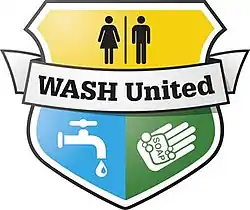WASH United
WASH (WAter, Sanitation and Hygiene) United is a non-profit organization.
 | |
| Founded | 2009 |
|---|---|
| Type | Non-governmental organization |
| Focus | Sanitation, Hygiene |
| Location | |
Area served | Sub-Saharan Africa and South Asia |
Key people | Thorsten Kiefer, Founder & CEO; Sören Bruhn, Co-Founder |
WASH United currently works in 8 countries in Sub-Saharan Africa and in India. In Africa, WASH United works in Burkina Faso, Ethiopia, Ghana, Kenya, Lesotho, Mali, Tanzania and Uganda. WASH United is registered as a non-profit limited liability company (gGmbH) in Berlin, Germany, where the organization’s international headquarters are. WASH United recently opened a regional office.[1]
Background
WASH United was founded in 2010 by Thorsten Kiefer. Kiefer, a devoted soccer fan, helped WASH gain attention at the 2010 FIFA World Cup in South Africa by coordinating promotions featuring soccer stars playing in the World Cup. Now, WASH United is still growing its ties with star athletes, as well as politicians, to help promote the club and achieve its goals. In 2012 they received the Sport for Health Award at the Beyond Sport Awards. As a registered United Nations non-governmental organization (NGO), in 2015 WASH United was granted special consultative status to the United Nations Economic and Social Council (ECOSOC).[2]
Purpose
Access to safe and clean drinking water is a crisis that is both severe and receives an alarmingly small amount of attention by international media. In 2010, the lack of access to drinking water and toilets caused more deaths in children than HIV/AIDS, measles, and malaria combined.[3] WASH United has the following goals:
1. To give toilets a "sexy" image. In hopes to increase attention around this issue, WASH United aims to spread an image that promotes desirability for toilets - an item that is seemingly commonplace and standard in developed countries.
2. To promote hand-washing. Many diseases and illnesses can be prevented by washing hands with soap and water, especially when handling food. Similarly, they wish to promote menstrual hygiene management, a topic that is highly taboo in certain cultures.
3. To encourage acknowledgement that safe drinking water and sanitization is a human right on an international level.[4]
Approach
WASH United uses the following tactics to promote clean drinking water and hygiene:
1. Using fun and interactive games. People are more prone to remembering things when they can associate them with memorable activities such as storytelling and games.
2. Using sports stars and celebrities to gain attention and utilize their role model statuses to inspire people about this topic.
3. Focusing on the positives and why toilets and clean water are appealing, rather than the damaging impacts that come from a lack of these necessities.[5]
Future plans
Currently, WASH United uses television, radio, and print media to communicate with its audience internationally. WASH United plans to expand their relief efforts and media presence to more countries.[6]
See also
- WASH - Water, Sanitation and Hygiene
References
- http://www.wash-united.org/
- Decision 2015/223: Applications for consultative status and requests for reclassification received from non-governmental organizations (PDF) (Report). United Nations Economic and Social Council (ECOSOC). 2015-07-20. p. 4. Archived from the original (PDF) on 2016-04-14. Retrieved 2020-08-19.
- "The water and sanitation crisis in a nutshell". Wash United. Retrieved February 14, 2013.
- "The water and sanitation crisis in a nutshell". Wash United. Retrieved February 14, 2013.
- "The water and sanitation crisis in a nutshell". Wash United. Retrieved February 14, 2013.
- "What we do and how it works". Wash United. Retrieved February 14, 2013.